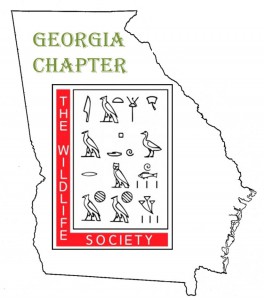McGlincy Presents Hurricane Michael Impacts on Rare Species at Georgia Chapter of The Wildlife Society
Joe McGlincy, Principal Biologist with Wiregrass Ecological Associates (WEA), presented at the recent meeting of the Georgia Chapter of The Wildlife Society (TWS) on the impacts of Hurricane Michael on rare species that inhabit southwest Georgia and the Florida Panhandle areas impacted by the storm. The species most affected by Michael was the Red-Cockaded Woodpecker (RCW), an endangered species that makes its home in mature pine forests. Several populations of this great species were in the path of Michael and their pine tree homes were heavily impacted. The rapid response by crews in the Apalachicola National Forest, Georgia Department of Natural Resources, and The Jones Center at Ichauway replaced many of these cavities to prevent further loss of individuals.  Following the destruction, all indications are that birds within these populations came through this catastrophic event in pretty good shape and had a successful nesting season this previous Spring. Other species impacted by the disaster include the Reticulated Flatwoods Salamander (RFS) and Gopher Tortoise, which typically reside in components of the same pine woodland homes as the RCW. While it is too early to tell what the long-term impacts will be for these species, we don’t expect any adverse impacts to gopher tortoises. However, several RFS breeding ponds were inundated with saltwater from the storm surge, which may have impacted the salamander breeding season. Mr. McGlincy is a long-time member, a TWS Certified Wildlife Biologist, and has served on numerous TWS committees, most recently the Editorial Advisory Board for the Wildlife Professional, a bi-monthly publication of TWS.
Following the destruction, all indications are that birds within these populations came through this catastrophic event in pretty good shape and had a successful nesting season this previous Spring. Other species impacted by the disaster include the Reticulated Flatwoods Salamander (RFS) and Gopher Tortoise, which typically reside in components of the same pine woodland homes as the RCW. While it is too early to tell what the long-term impacts will be for these species, we don’t expect any adverse impacts to gopher tortoises. However, several RFS breeding ponds were inundated with saltwater from the storm surge, which may have impacted the salamander breeding season. Mr. McGlincy is a long-time member, a TWS Certified Wildlife Biologist, and has served on numerous TWS committees, most recently the Editorial Advisory Board for the Wildlife Professional, a bi-monthly publication of TWS.
*******
TWS (www.wildlife.org) is the national professional organization of wildlife biologists. The Wildlife Society is a strong and effective voice in representing wildlife conservation and management and ensuring sustainable wildlife populations in healthy ecosystems. Founded in 1937, the mission of TWS is to inspire, empower, and enable wildlife professionals to sustain wildlife populations and habitats through science-based management and conservation.